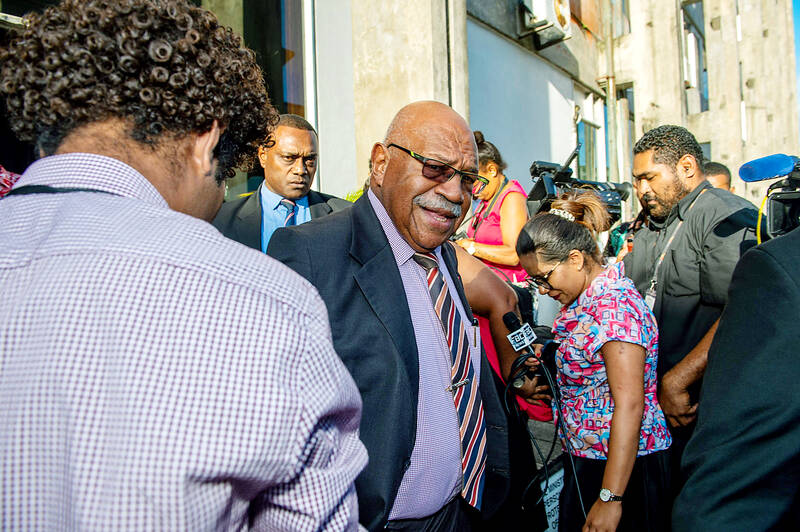Fiji yesterday suspended its police commissioner after a general election led to the first change in government in the Pacific island nation in 16 years, after the military earlier warned against “sweeping changes.”
Fijian President Ratu Wiliame Katonivere said Fijian Police Commissioner Sitiveni Qiliho had been suspended on the advice of the Fijian Constitutional Offices Commission, “pending investigation and referral to and appointment of a tribunal.”
Fijian Elections Supervisor Mohammed Saneem was also suspended by the commission, the statement said.

Photo: AFP
Qiliho declined to comment to local media because he said he would face a tribunal over his conduct.
He was seen as being close to former Fijian prime minister Frank Bainimarama, who led the country for 16 years before a coalition of parties narrowly won an election in December last year and installed Sitiveni Rabuka as prime minister of the strategically important Pacific nation.
The day before a coalition agreement was struck, Qiliho and Bainimarama called on the military to maintain law and order because they said the hung election result had sparked ethnic tensions, a claim disputed by the coalition parties.
The Pacific island nation, which has a history of military coups, has been pivotal to the region’s response to competition between China and the US, and struck a deal with Australia in October last year for greater defense cooperation.
On Thursday, the Fiji Times reported that Rabuka had announced his government would end a police training and exchange agreement with China.
“Our system of democracy and justice systems are different so we will go back to those that have similar systems with us,” it quoted Rabuka as saying, referring to Australia and New Zealand.
The prime minister’s office did not immediately respond to a request for comment.
Fijian Military Forces Commander Major General Jone Kalouniwai earlier this month warned Rabuka’s government against making “sweeping changes,” urging it to abide by a 2013 constitution that gives the military a key role.

Tropical Storm Gaemi strengthened into a typhoon at 2pm yesterday, and could make landfall in Yilan County tomorrow, the Central Weather Administration (CWA) said yesterday. The agency was scheduled to issue a sea warning at 11:30pm yesterday, and could issue a land warning later today. Gaemi was moving north-northwest at 4kph, carrying maximum sustained winds near its center of up to 118.8kph and gusts of 154.8kph. The circumference is forecast to reach eastern Taiwan tomorrow morning, with the center making landfall in Yilan County later that night before departing from the north coast, CWA weather forecaster Kuan Shin-ping (官欣平) said yesterday. Uncertainty remains and

SEA WARNING LIKELY: The storm, named Gaemi, could become a moderate typhoon on Wednesday or Thursday, with the Taipei City Government preparing for flooding A tropical depression east of the Philippines developed into a tropical storm named Gaemi at 2pm yesterday, and was moving toward eastern Taiwan, the Central Weather Administration (CWA) said. Gaemi could begin to affect Taiwan proper on Tuesday, lasting until Friday, and could develop into a moderate typhoon on Wednesday or Thursday, it said. A sea warning for Gaemi could be issued as early as Tuesday morning, it added. Gaemi, the third tropical storm in the Pacific Ocean this typhoon season, is projected to begin moving northwest today, and be closest to Taiwan on Wednesday or Thursday, the agency said. Today, there would likely

DISRUPTIONS: The high-speed rail is to operate as normal, while several airlines either canceled flights or announced early departures or late arrivals Schools and offices in 15 cities and counties are to be closed today due to Typhoon Gaemi, local governments announced last night. The 15 are: Taipei, New Taipei City, Taoyuan, Tainan, Keelung, Hsinchu and Kaohsiung, as well as Yilan, Hualien, Hsinchu, Miaoli, Chiayi, Pingtung, Penghu and Lienchiang counties. People should brace for torrential rainfall brought by the storm, with its center forecast to make landfall on the east coast between tonight and tomorrow morning, the Central Weather Administration (CWA) said. The agency issued a sea warning for the typhoon at 11:30pm on Monday, followed by a land warning at 11:30am yesterday. As of

CASUALTY: A 70-year-old woman was killed by a falling tree in Kaohsiung as the premier warned all government agencies to remain on high alert for the next 24 hours Schools and offices nationwide are to be closed for a second day today as Typhoon Gaemi crosses over the nation, bringing torrential rain and whipping winds. Gaemi was forecast to make landfall late last night. From Tuesday night, its outer band brought substantial rainfall and strong winds to the nation. As of 6:15pm last night, the typhoon’s center was 20km southeast of Hualien County, Central Weather Administration (CWA) data showed. It was moving at 19kph and had a radius of 250km. As of 3pm yesterday, one woman had died, while 58 people were injured, the Central Emergency Operation Center said. The 70-year-old